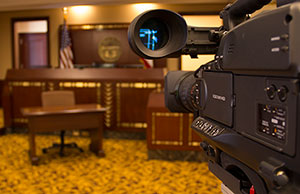Federal Courts Continue Experimentation with Cameras

Federal courts continue experimentation with cameras as pilot project passes one-year mark.

Federal courts continue experimentation with cameras as pilot project passes one-year mark.
A year after the federal Judiciary began its cameras in the courtroom pilot program in 14 federal trial courts, 39 court proceedings are available online for public viewing on the Judiciary’s website. The Northern and Southern district federal trial courts in Ohio are participating in the pilot project.
The video recordings and brief summaries of the cases are organized by court, subject matter, and procedural posture. The posted videos have been viewed more than 28,000 times since the pilot began in July 2011.
The 14 courts volunteered for the pilot and were selected by the Judicial Conference Committee on Court Administration and Case Management (CACM) in consultation with the Federal Judicial Center, which is studying the 3-year pilot.
“From the start of this digital video pilot program, the CACM Committee has emphasized the importance of public access,” said Judge Julie A. Robinson (D. Kan.), CACM Committee chair. “It is encouraging that so many civil proceedings are now available online for the public to see, as if they were in the courtroom themselves.”
Participating courts follow endorsed by the Conference. The courts record the proceedings themselves; proceedings may not be recorded without the approval of the presiding judge and the parties in the case. The pilot includes only civil cases; photographing or broadcasting criminal proceedings in federal courts has been prohibited under Federal Rule of Criminal Procedure 53 since 1946.
The federal Judicial Conference has authorized each appellate court to decide whether to permit broadcasting of oral arguments. Two circuit courts of appeal – the Second and the Ninth – allow such coverage.
In contrast to the federal courts, Rule 12 of the Rules of Superintendence for the Courts of Ohio permits cameras in Ohio courtrooms subject to the discretion of the presiding judge. The rule has been in place in Ohio since at least 1973.
Ohio Supreme Court Chief Justice Maureen O’Connor recently called on the federal courts to expand the use of cameras to provide citizens with more information about the federal judicial system, citing the decades of experience state courts like Ohio have in successfully allowing cameras to record and broadcast proceedings.
“By allowing cameras in to show the proceedings, the U.S. Supreme Court could play a significant role in fostering a greater public understanding about how courts work, especially appellate courts,” Chief Justice O’Connor said in a February speech to the Rotary Clubs of Heath, Granville, Pataskala and Newark. “I hope our counterparts in the federal system progress to where we’ve come and open their doors for all the world to see. Without that access, misconceptions about what courts do will persist.”
Since March 2004, video of every case argued before the Supreme Court of Ohio has been recorded and archived for viewing. Visit this site to access past oral arguments: http://supremecourtofohiomedialibrary.org/MediaSearchResults.aspx.


